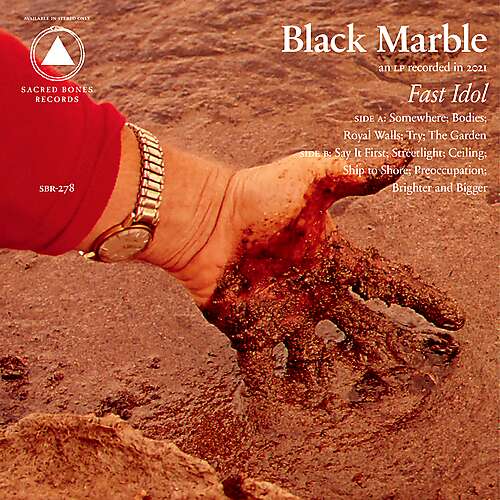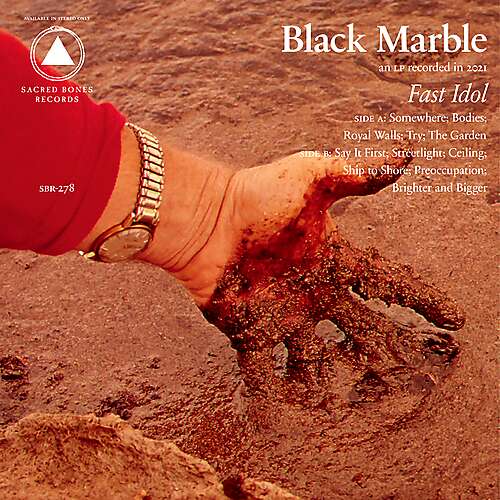Black Marble
Black Marble
country: USA
genre: Indie
styles: Art Pop, Chillwave, Dark Post-Punk, Synthpop, Cold Wave, Minimal Wave

Fast Idol
 LP
LP
Spotify Bandcamp Soundcloud
Reviews and Comments
On Fast Idol, LA-based Black Marble reaches back through time to connect with the forgotten bedroom kids of the analogue era, the halcyon days of icy hooks and warbly synths always on the edge of going out of tune. Harmonies are piped in across the expanse of space, and lyrics capture conversations that seem to come from another room, repeat an accusation overheard, or speak as if in sleep of interpersonal struggles distilled down to one subconscious phrase. At the same time, percussive elements feel forward and cut through the mix with toms counting off the measures like a lost tribe broadcasting through the bass and tops of a basement club soundsystem.
Fast Idol is Stewart's fourth full-length album and his second for Sacred Bones. His previous album Bigger than Life was written in the face of cultural shifts in the US, in experiencing these he realised he was not keyed into certain negative sentiments that were bubbling below the surface, which were breaking out into the open. “I chose to try and take the approach of a soothsayer writing from a macro level, trying to find strands of connection between us because it didn’t feel appropriate to create something self referential and gloomy at the time,” he says.
Now, Fast Idol sees him return to a sentiment and process that defined the earlier days of Black Marble, in a return to his intuitive song writing process where songs land as impressionistic snippets of daily conflicts, and people struggle with the challenge of trying to move through the world. “People don’t expect me to be responsible for altering their outlook or mood, they come to hear something that meets them where they are. I trusted on this record that if I stayed in that space and created things from that more mysterious place, it would connect with others.”
Melodies roll with the fizz and charm of Jacno and phrases repeated are electric torchlight ballads sung after hours in William Gibson’s San Francisco. 'Somewhere' opens in sombre herald, before dropping into a fast freeway tempo; the glassy synths and crisp beats cut through the anxious moods on 'Bodies' and 'Try' sits in a lineage with cult bands like Asylum Party. 'The Garden' is a journey through a post-apocalyptic cityscape, earthed by the pulse of a drum machine whereas 'Ship To Shore' could be a lost Oppenheimer Analysis B-side, and the album’s closer 'Brighter and Bigger' catches a sentiment like The Dadacomputer has learned to feel emotions.
Black Marble is the universal and enigmatic observer at the centre of his music, watching time passing, the world changing, and embracing the anxiety it brings. He captures the loneliness of Ray Bradbury’s atomic-era sci-fi and the apocalyptic but revolutionary spirit of Godard’s Sympathy for the Devil, as in ‘Preoccupation’, the beating heart of the album, which conjures ambivalent scenes of an empty world and the comfort to be found in a shared humanity in lyrics that state: “What is gone only people and time, standing tall covered cities and signs. Well I’ve wandered the west side and I’ve laughed at your broken roads but this feeling of preoccupation makes life whole.”
Stewart writes and plays everything himself, and tours with a rotating cast of players. Emerging from the early 2000s New York synth scene, Black Marble carried on the tradition of early synthwave pioneers like Martin Dupont and Modern Art who repurposed synths once reserved for expensive studios and stadium rock superstars. Available widely and cheaply for the first time, these synths became a staple for bedroom artists – connecting wires and twisting knobs into something that felt entirely new. Seeking to channel this spirit, Black Marble recalls the gauzy tape wow and flutter of The Membranes and the warbling VCO of Futurisk, carrying on a sound that seeks to channel the future while imprinting residue of the past. These early reference points are still audible, an electronic sound steeped in punk spirit, galvanised by passion: "When I started making songs I got enough positive feedback just to keep me going," Stewart says, "and then I never stopped."
Black Marble was signed with just one song available online, and Stewart has been writing songs and making music ever since, beginning with A Different Arrangement on Hardly Art in 2012, followed by It's Immaterial in 2016 on Ghostly International and Bigger Than Life on his current label Sacred Bones in 2019, with two EPs also to his name. "On my previous album I was more specific about the themes I was talking about," Stewart says. "Fast Idol goes back to the songwriting on my early records, where the themes were guided by intuition and instinct – often, their meanings only become clear to me after they're written."
Fast Idol sees Black Marble face the rising tide of uncertainty, leaving our future selves to trace its signal as its frequencies echo into an interstellar expanse, looking for a receiver. He says: "I want my music to stick with you after I leave, even though you might not feel like you’re any closer to knowing it."
latest releases
 Single
Single
Preoccupation
out on September 21, 2021
via Sacred Bones Records
 Single
Single
Ceiling
out on August 24, 2021
via Sacred Bones Records
 Single
Single
Somewhere
out on July 27, 2021
via Sacred Bones Records
 EP
EP
I Must Be Living Twice
out on August 14, 2020
via Sacred Bones Records



















